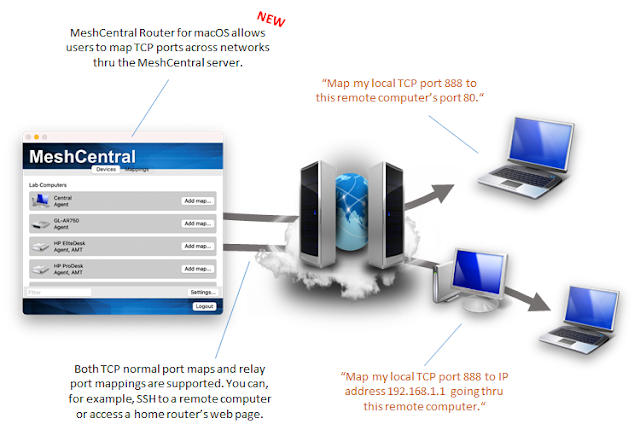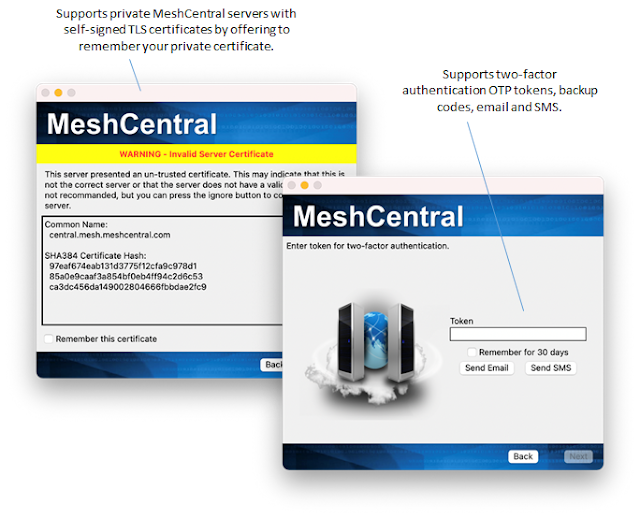MeshCentral - MeshCentral Router for macOS
This is going to be the last post of 2020 and finishing off the year with another big release. In the past two week the Mesh team learned the Swift programming language and how XCode and SwitfUI worked. It’s been a difficult learning curve but used the time to build a completely new version of MeshCentral Router for macOS. This release complements the MeshCentral Router for Windows that was released a long time ago. As a recap, MeshCentral Router allow TCP port mapping of local ports to remote ports on any device in your MeshCentral account. Once mapped, you can open web pages, used any TCP application you like including performing an SSH or RDP session to a remote device without a VPN. This capability is super useful to many users and now, it’s available on macOS! In details:
- Native Swift built MeshCentral Router. This is a full rebuild of MeshCentral Router for macOS coded in XCode with the Swift programming language. The binary is compiled for both Intel x86 and Apple Silicon and installs like any other macOS application.
- Support for private servers and 2FA. Users will immediately notice that like the Windows version, this version of the router supports advanced login options including two-factor authentication using OTP, backup codes, SMS and email. If you are using a private server on the local network or on the Internet, MeshCentral Router will accept non-trusted TLS certificates so that you can make this application work on your server immediately.
- Real-time device display and status. Just like the MeshCentral web site, there is no need to hit a “refresh” button. The router will display in real-time the devices in your account and their state. This way, you can quickly get to work. There is a filtering option so you can type a partial device name and quickly find the device you are looking for.
- TCP mapping and relay mappings. MeshCentral Router supports mapping a local port on your device to a remote port on a remote device that has the MeshAgent installed. There is no need to install the MeshAgent on your local device, just the router and the MeshAgent on the remote device. In addition to this, MeshCentral Router supports “relay mappings” where you select a remote device to forward traffic and a target IP address and port. This can be useful to access a service on a remote device that does not have the MeshAgent installed, like a home router web page.
- Load and save mappings. Once you have your TCP mappings setup, you can save these to a .mcrouter file and come back to your server and pre-set mappings quickly by loading the mapping file back. The .mcrouter file is the same format as the Windows version of MeshCentral Router, so you can exchange files if you like.
- Launch from the web site. The macOS version of MeshCentral Router will assign itself the “mcrouter://” protocol allowing it to be launched directly from the MeshCentral web site. When launched from the site, no app login is needed making it a perfect way to launch from a signed sign-on (SSO) account. You can also launch SSH sessions directly from the MeshCentral web site in a single click since MeshCentral router supports creating ports maps using instructions given by the server.
- Support for Retina displays and night mode. MeshCentral router was built with high definition icons and graphics making the application look great on high definition displays that are typically attached for macOS devices. In addition, night mode was tested to make sure the router looks great in both normal and dark modes.
As usual, MeshCentral Router is open source under Apache 2.0 license and on GitHub here. Improvements and pull requests are appreciated. In addition to this, MeshCentreal has many more bug fixes and improvements. As usual, feedback is appreciated. If you see any problems and need support on something, please create a new issue on GitHub or help other users.
Thank you everyone and happy holidays!
Ylian
MeshCentral: https://meshcentral.com
Twitter: https://twitter.com/meshcentral
Reddit: https://www.reddit.com/r/MeshCentral/
GitHub: https://github.com/Ylianst/MeshCentral/issues







